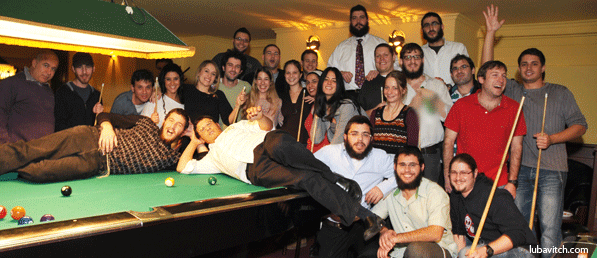(lubavitch.com) When Noa Popovich–Hadari of Haifa left Israel six years ago for medical school in Hungary, she was single, a self-described secular Jew, and homesick.
“School was so demanding that you could not go home,” she said.
By the time she earned her M.D. this June, she was married to a fellow Israeli student and had become a regular at Shabbat dinners and holiday celebrations at Keren Or Chabad Israeli Center, directed by Rabbi Shmuel and Devorah Leah Raskin.
“They were a warm and loving second family to us,” said Dr. Popovich-Hadari. By “us,” the 28-year-old doctor not only includes her husband, Dr. Amit Hadari, but also the 700 Israeli students attending Hungarian universities to earn medical, veterinary, architectural and other advanced degrees.
Dr. Popovich-Hadari took her place of honor among the 50 other Israeli medical students at Chabad Israeli Center’s gala Shabbat dinner hosted in their honor last week. As their years in Hungary came to an end, Chabad of Hungary celebrated with them, and revealed plans for expansion.
Toasting the new graduates in Hebrew at the Hotel Intercontinental ballroom, 300 guests – proud family and friends from Israel and Budapest’s Jewish community – saluted Chabad’s role in helping the students survive their years of studies and internship. Young docs rose to thank Chabad for giving them a greater appreciation for Jewish life and thought.
“We are secular Jews. Were are not from religious backgrounds,” said Dr. Popovich-Hadari. “It was when we moved to Hungary that we saw the beauty of Judaism. Things we never knew we had to leave Israel to learn.”
Since their arrival in 2001, the Raskins have seen the Israeli university student population spread Hungary-wide. Ever chasing a more economic and practical way to realize their dreams of becoming professionals, the Israeli student population has dispersed from Budapest, the traditional choice, to Debrecen and now to Szeged. Accordingly, Chabad of Hungary, under the direction of Rabbi Boruch and Batsheva Oberlander, sent representatives to these locales. By fall of this year, before the High Holiday season, Chabad of Hungary will be placing a couple as permanent representatives to Debrecen.
Every week, a crowd of 200 Israeli students, business people and tourists sits down for Shabbat meals with Rabbi Raskin and his family. Saturdays, after prayer services, the Raskins present a more intimate meal at their home for twenty to thirty guests. Monday through Thursday, their classes provide a homey community for entrepreneurs commuting via weekly three-hour flights between Hungary and Israel.
A taste of home is not enough for medical school students a few brief years away from holding lives in their hands. They require a bedrock of ethics to make life decisions that are rarely black and white. University of Budapest and University of Debrecen both offer college credits for Rabbi Oberlander’s medical ethics course. He teaches two classes per semester, one for Israeli students, one for Hungarian students, each with an enrollment of 50 students.
“The course opens a new way of thinking for the students,” Rabbi Oberlander said. “They understand why people wish to consult a rabbi, even if he has no medical knowledge, and they know when they should ask questions themselves.”
Weighing when to harvest organs or prolong life, when to perform an abortion, when to implant an embryo – topics that generate vociferous debate in Rabbi Oberlander’s classes – are decisions that dangle in the medical students’ future. More of an immediate concern for these students who arrive in Hungary in their twenties and leave in their thirties is who to marry. Shabbat meals, holiday gatherings and social events for Israeli students creates a social matrix, where long term relationships take root.
“Lately,” said Rabbi Raskin, “Israeli medical students have been marrying each other.”
Rabbi Raskin flew to Israel to officiate at Noa and Amit’s wedding, starting a trend that ten couples have followed. Capturing the zeitgeist, Chabad’s Jewishhungary.com site now advertises the Raskins’ willingness to prepare the engaged couple for a Jewish marriage and family life.
Dr. Popovich-Hadari will be spending this year completing a year of residency in Israel. Between patients, she may see Rabbi Raskin. He hosts programs for alumni in Israel, just in case they get homesick — for Hungary.

Be the first to write a comment.